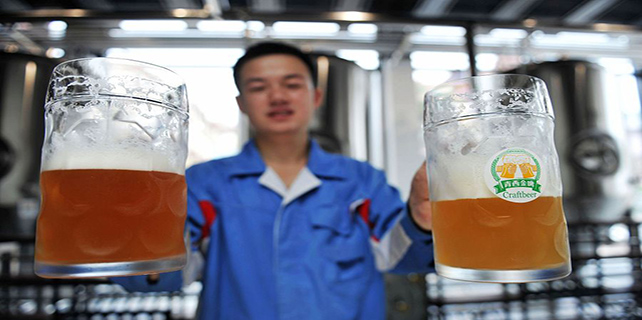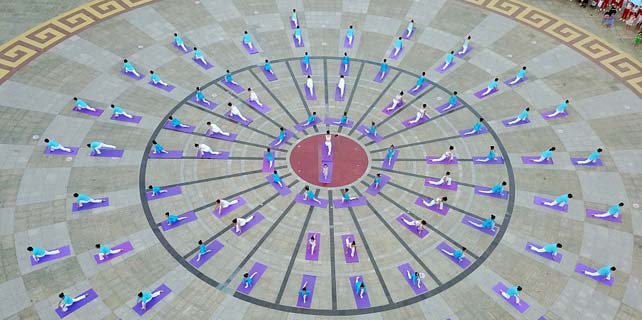Chinese companies keep Tennessee economy humming
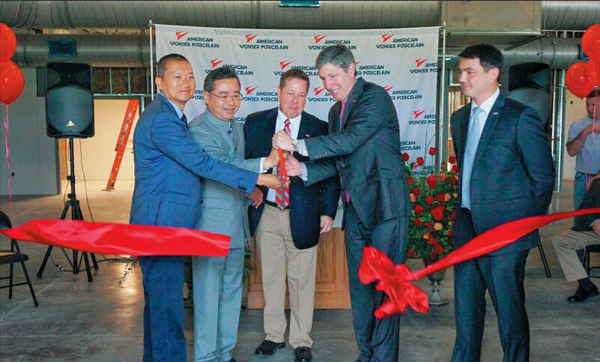 |
|
From left: Weiqiang Zhong, of American Wonder Porcelain and Jianping Huang, chairman and president of The Wonderful Group, are joined by Michael Kephart, president of American Wonder Porcelain, Bob Rolfe, commissioner of Tennessee Department of Economic and Community Development and Bill Griese, of the Tile Council of North America, at a ribbon-cutting ceremony at the American Wonder Porcelain plant in Lebanon, Tennessee, earlier this year. PROVIDED TO China Daily |
The southern state has benefited from foreign direct investment in the US and the rise of mainland firms setting up factories there
Frank Chen, the CEO of Sinomax USA, had been looking for a location for some time.
Logistics were developing into a challenge as "bedding products are bulky, and it takes a lot to ship them a long distance", he pointed out.
So in 2013, when retail giant Wal-Mart Stores Inc unveiled a plan to bring back manufacturing jobs to the US, Chen decided it was time for his Hong Kong-based company to find a stateside location. He went for Tennessee.
For Jianping Huang, chairman and president of The Wonderful Group, based in Dongguan, Guangdong province, proximity to the US market was a key factor in opening a US ceramics plant.
"We want to be near our customers in the US," Huang said. "The American ceramic industry imports about 70 percent of its product, with about 13 percent of that coming from China. Setting up this factory is better for our customers."
Huang also chose Tennessee.
Chinese companies have provided a boost to the southern state's economy in recent years, whether it's building a new plant or retrofitting an old factory.
Data from the state's Economic and Community Development department in 2015 and 2016, showed Tennessee attracted $3.18 billion of foreign direct investment. China accounted for about $270 million of that and helped create more than 1,000 jobs.
The TN China Network, a trade promotion group, confirmed that by June there were 47 companies in the state that received Chinese investment.
According to the New York-based Rhodium Group, the top four industries for investment are health and biotech, followed by automotive and aviation.
All this has a local impact.
"We were happy that the Chinese were coming. Any investment is a big deal for us because it helps our local economy," said Bernie Ash, mayor of Lebanon, Tennessee, upon learning that The Wonderful Group would invest $150 million and open a porcelain plant in his hometown.
In La Vergne, 27 miles southwest of Lebanon, more than 500 jobs were lost when Whirlpool Corp closed a plant there in 2008.
Sinomax USA recently opened a factory and will eventually employ more than 300 workers.
City Administrator Bruce Richardson welcomed Chinese investment.
"We are happy to see the facility back in use, and we hope that a lot of La Vergne residents will be able to get jobs there to support their families," Richardson wrote in an email.
Ceramics have also become important to the state.
Porcelain was developed in China more than 2,000 years ago before being exported to Europe and the rest of the world.
The American Wonder Porcelain facility signifies the first investment in the US from a Chinese ceramic tile manufacturer. The Wonderful Group is a division of Marco Polo, which is the largest producer of ceramic tiles in China.
Its factory is adding to Tennessee's roster of ceramic plants-there are now six. Indeed, that was a major reason why the Wonderful plant was rolled out in Lebanon.
"Other ceramic factories are in Tennessee-there is a good supply of raw materials, and the Tennessee government welcomed us here," Huang said.
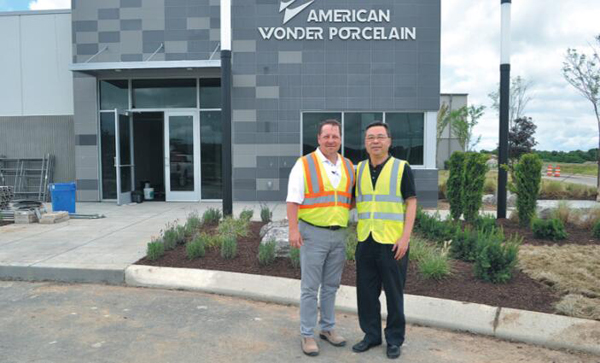 |
|
Michael Kephart (left), president of American Wonder Porcelain and Jianping Huang, chairman and president of The Wonderful Group, outside of the American Wonder Porcelain plant in Lebanon, Tennessee. PAUL WELITZKIN / CHINA DAILY |
Michael Kephart, a veteran of the ceramic tile industry, was hired by Huang to be president and CEO of American Wonder Porcelain. "Our goal is to produce high-quality, finished porcelain tiles that will be used in floors, walls and counters in residential and commercial applications," he said.
Porcelain is made from raw clay and other materials. "We mix it together with water to produce slurry that is dried, milled and processed before it is heated up," Kephart added.
He admitted that he was not surprised to be working for a Chinese company. "I have worked in Europe and Asia before," he said.
In addition to Wonderful Group team members from China who are helping to set up the Lebanon plant, there are workers from Italy and other countries at the facility to help install machinery. There are also residents from the community who need to be trained.
Kephart believes that such diversity may be a harbinger of what a typical American workplace will look like in the future. He also praised Huang for enabling him to set up "a Western type of company". "Despite some language differences, our team is cohesive, productive and dedicated," he said.
The plant has 50 to 60 employees, and when it begins full production, Kephart anticipates a workforce of 175 to 225.
Riley Tang, who worked for The Wonderful Group in China, has been living in the Lebanon area for two years.
"The people are nice and kind to everyone. I like living here and noticed that country music is very popular," he said through an interpreter.
Even with language hurdles, Tang described a smooth operating team. "We get along well, and (they) help me in work and life," he said, adding that he would not object to staying in Tennessee and making a career there.
Brian Messamore has lived in the state for 10 years and is a veteran of the ceramic industry. He said that diversity is a way of life in the sector. "Right now manufacturing porcelain tile in America is a multicultural thing," he said. "There is always a lot of cultural diversity.
"I think there is a lot we can learn from the Chinese, and there is a lot they can learn from us," he added. "There is a bond developing on this team."
Bonds are also important to Sinomax USA, which manufacturers memory foam bedding and related products. It has been a supplier to Walmart since 2006, and the company has since added Costco and Kohl's as clients.
"We were considering making an investment in the US several years ago," said Chen, who comes from Beijing.
"Initially we considered a partner for a joint venture. But that didn't work because it's hard to find the right one," he added.
Chen then thought about acquiring an existing US company, but that did not pan out either. Meanwhile, he said it was getting harder to take care of his US clients from a manufacturing base in China.
In 2013, Walmart unveiled a $250 billion initiative to bring back manufacturing jobs that had been outsourced to China and other nations.
Rightly or wrongly, the company had been blamed for sending thousands of US jobs overseas since the 1990s.
That program turned out to be the tipping point for Chen and his company's ambitions in the world's biggest economy.
"Walmart's program certainly helped us decide to make a US commitment," he said.
Chen then had to decide on a location for his first plant and whether to construct a new building or remodel an existing one.
"Location was very important to us," Chen recalled. "Somewhere in the Southeast would put us close to most of our major customers."
Initially, Chen identified eight states and then narrowed his choice to two-Arkansas and Tennessee. Arkansas offered a very attractive package.
But a closed Whirlpool plant near La Vergne just outside of Nashville met all the requirements Chen was seeking for his $28 million investment.
There was rail access to the building. "That was important to us. But it was also close to major highways, and Tennessee is an ideal location," he added.
While the state provided incentives, there was another important factor in selecting La Vergne.
"The reason we came here wasn't just the incentives," Chen said. "We came here because there are technical schools and community colleges and universities nearby.
"This allows us to recruit a deep talent pool in the area," he added.
Bruce Miller, executive vice-president of operations at Sinomax, assembled a team for the Tennessee facility. When he told everyone the company owners were from China, the response was interesting.
"At first, the reaction was most jobs are going from the US to China. Now a Chinese company is bringing jobs to the US," Miller said.
"It was a change and it was, 'Wow this is a great new trend.' American workers can compete with those from outside of the country," he added.
When Tao Zhu was one year old, he and his parents left Fuzhou in Fujian province and moved to Minneapolis. Zhu was educated in Minneapolis and received his bachelor's degree from the University of Minnesota. He is now an engineer at Sinomax.
"I never really expected it," he said of learning that Sinomax was a Chinese-owned company.
"I didn't see that many Chinese companies in the US. I was more aware of outsourcing to China, especially in manufacturing," Zhu added. "I feel lucky to be a part of this company. Having them build this plant here shows they are taking the initiative to bring jobs here."
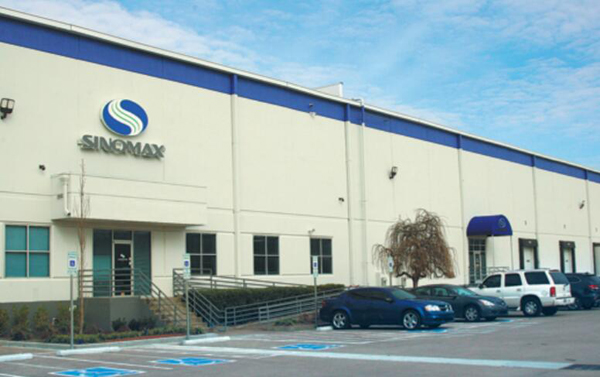 |
|
The Sinomax plant in La Vergne, Tennessee. PROVIDED TO China Daily |
DeWayne Cid, a product data manager for Sinomax who has lived in the area for 12 years, likes the company's approach.
"It may be a Chinese-owned company, but it is providing Americans with jobs," he said. "The company has partnerships and is supplied by other American companies.
"It does matter that we are manufacturing in the US and are not just distributing. That has really impressed me," he added.
Foreign direct investment has helped create a vibrant job market in a state that until recently had been known for agricultural products and a country music shrine, the Grand Ole Opry.
Beginning in the 1980s, Tennessee's economy began to shift from manufacturing nondurable products, such as leather goods and chemicals, to making durable products, according to Bill Fox, director of the University of Tennessee's Boyd Center for Business and Economic Research.
"We added a lot of employment in durable manufacturing, specifically in automobile production," he added.
Tennessee, called the Volunteer State, "has outpaced the nation by modest amounts since the 1980s. The transition in the state's economy has been as important as the growth," Fox said.
Now Tennessee is referred to by many as the "Detroit of the South". The automobile industry helped kick off the foreign direct investment wave in the state.
Japan's Nissan Motor Co Ltd put Tennessee on the auto industry map, Fox pointed out, when it opened an assembly plant in Smyrna, outside the state capital of Nashville, in 1983.
"From there it expanded to Spring Hill when General Motors opened a Saturn plant in the 1990s, and recently we had Volkswagen open a plant in Chattanooga," he said.
In turn, the automotive plants helped unleash a wave of investment from auto parts manufacturers and suppliers-many of them foreign-owned-"all over the state".
Yanfeng USA, the largest Chinese manufacturer of automotive interior components and a subsidiary of Shanghai Automotive Industry Corp, built a plant near Chattanooga.
In 2014, South Korea's Hankook Tire Co Ltd broke ground for an $800 million car and light-truck tire plant in Clarksville which may employ up to 1,200.
Hankook also intends to put its North American headquarters in Nashville. Japan's Bridgestone Tire is also there.
In April, Germany's Wacker Chemie AG officially opened its new polysilicon production site in Charleston. The $2.5 billion investment is expected to create about 650 jobs.
"There is no doubt that it (FDI) has been critical for us. We have led the nation (in FDI) the last couple of years," said Governor Bill Haslam.
Huang, chairman and president of The Wonderful Group, is aware that his company's US investment will be closely watched in China.
"The Wonderful Group investment has been mentioned in the media. Many will watch and see if we are successful," he said.
"If we are a success, it will be a good example for other Chinese companies," Huang added.
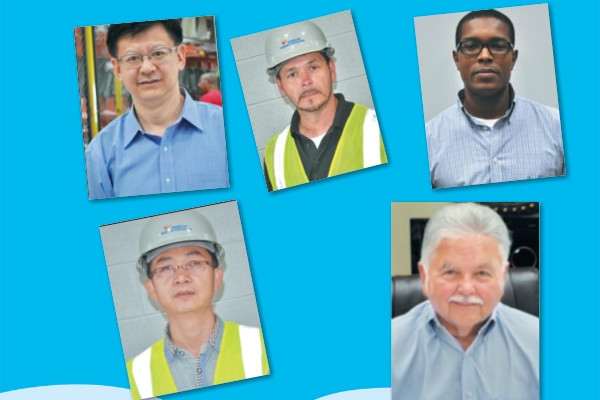 |
|
Clockwise: Frank Chen, CEO, Sinomax USA; Brian Messamore, American Wonder Porcelain; DeWayne Cid, product data manager, Sinomax USA; Bernie Ash, mayor of Lebanon, Tennessee; and Riley Tang, American Wonder Porcelain [PROVIDED TO China Daily] |
Weaver helps sell business opportunities
Li Weaver's job to is to represent and market the state in China as director of business development for the Tennessee Department of Economic and Community Development.
She is a native of Taiyuan in Shanxi province, which is a sister city to Nashville, Tennessee's capital. She is also fluent in English and Mandarin.
Weaver said many members of the Chinese business community are at least somewhat familiar with Tennessee, and when discussing the state with them, she emphasizes its location, vibrant manufacturing economy and pro-business attitude.
"Tennessee is perfectly located to service the eastern half of the US, particularly the Southeast," she said. "Our existing advanced manufacturing base helps to attract other companies.
"For example, we have a lot of automotive companies in China looking at the state because we already have a thriving auto industry," she added. "Our business-friendly environment and tax policies are also big draws."
Weaver believes that her office is crucial in attracting Chinese foreign direct investment.
"The relationships that we build are very important," she said. "We can help to bridge language and cultural gaps."










